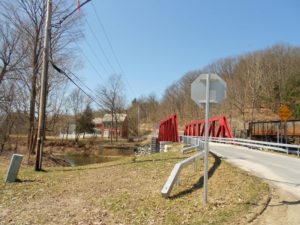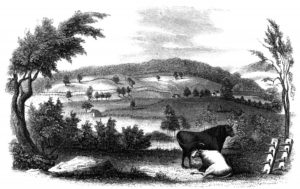Andebit et beaqui corendit, ut quostes esciendion re dit ad et prae parion es quia quas alibus sam, omnim faciden ducipidiat arum autem nobis enis es voat

Baum Site 22: Prelude to the Battle
Listen to the Road to the Battle of Bennington Site 22 Audio Narration:

Leaving a small guard at the Sancoick Mill, Baum’s army moved eastward on the dirt road along the Walloomsac River and arrived at a hill overlooking a small bridge – possibly the same location of the single-span bridge across the Walloomsac that now stands at the base of Caretaker Road.
With a clear view of the Walloomsac valley, Stark dispatched a contingent of troops to assist Gregg’s retreat. When one of Baum’s Indian elders pursued the retreating Rebels too closely, he was shot and killed. Saddened by the incident, the Indians held a burial ceremony and sixteen Dragoons fired three volleys. While the Indians were satisfied with the gesture of respect, it alarmed the retreating Rebels who returned to attack Baum’s army from the northeast and southeast.

Stark and Baum each probed each other’s forces, Baum immediately became aware of a large Rebel force on a ridge opposite them. If Baum proceeded onto the flats beyond the river, the enemy artillery would bombard them. So Baum decided to secure his position, which afforded him the advantage of an elevated position with a natural water-barrier. Baum’s troops fired their cannons at the rebels until they retreated. By the end of the day, Stark knew the size and strength of Baum’s command, while Baum and his troops had learned how the Rebels and Indians fight.
Both Baum and Wasmus wrote about the way the Indians and Rebels fought – firing a few shots and then retreating to the woods. This was a very different way to fight a military battle, today we call it guerrilla warfare.
At noon, we arrived at the Walloon [Walloomsac] Creek just before the bridge across the river. We made ou camp in the garden of two houses here. The inhabitants had loaded 2 wagons full of furniture and put 6 oxen to them. They were just about to depart and take flight in the wilderness. But now they had to unload and our commander placed a guard in front of both houses so that nobody could take anything from them. They could safely remain there, for none of our men would take anything from them. Every one of us was happy enough if he could manage all that his shoulders were already forced to carry. But it was the habit of the Savages to scalp and demolish everything.
On the other side of the river stood another two houses at which the Savages, the Tories and the Canadians had taken as their posts. On our left, we had a very high mountain, which extended quite far. The oldest of all Savage Mohawks, who they venerate as their king, was hot on our arrival at the bridge today. He had ventured out too far, perhaps to take some booty. The Savages were very grieved and sad about this incident. They made a kind of coffin, laid the dead man in it and carried him to a grave 4 feet deep. Carrying his musket to the grave, a detachment of 16 dragoons from our detachment fired 3 volleys. The Savages appeared to be very satisfied with that. On the other hand, the enemy seemed to be alarmed.
An enemy corps of some 1,900 men stood about half an Engl. Mile in front of us behind a height. Since they had heard the bullets whistle at the burial shooting – the dragoons had loaded with balls–, they probably thought we were attacking them. They appeared on the height and attacked our patrols positioned there. We, the Dragoons, quickly took possession of the mountain on our left and our cannon were taken up that mountain. The enemy, still behind trees, however, focused their attack on our right and left wings at the foot of the mountain. On this side of the river stood our jagers and light infantry, namely the detachment that had come to us under the command of Capt. Dommes on the 12th. The enemy sneaked behind a house that stood on the other side of the river, where they loaded their guns and shot at our left wing. One cannon was being directed against this house and fired. As the 2nd shot went through the house, the enemy came out at full speed and ran away. On our right wing, they were likewise driven back and our cannon on the mountain pursued the enemy by the bridge, cannonading them on their retreat.
We have seen today how the enemy attacks: either lying on the ground or standing behind trees, they load their guns and shoot. They run from one tree to another and then forward as circumstances demand, and the Savages do likewise. The house across from our left wing, behind which the enemy had hidden, was set afire. On our side nothing was killed or wounded, but in this affair the Savages had one killed and 2 wounded. I bandaged one of them, who had a bullet in his arm. When I had to cut it out, the Savage behaved rather shockingly and if I had been alone with him, I believe he would have scalped me; N.B. if he could indeed have overpowered me.
The Savages were so enraged about this loss that they wanted to depart for Canada tonight. Perhaps they thought themselves rich enough for they had collected much money among themselves, also stolen some and sold many horses to officers in the army; almost every one of them had a horse laden with all kinds of stolen goods. The affair had not quite ended when another detachment of 50 men from our regiments came to us; they joined Capt. Dommes.
Captain MacKay was very dissatisfied that the enemy had not been attacked and pursued with vigor. “Now they will become bold,” he said, “we leave them too much time, for they will gather by the thousands during the night.”
“I cannot understand,” he added, “how one can entrust a detachment to such a man as Lieut. Colonel Baum, who has no military expertise at all, cannot take proper measures, particularly here in the wilderness, and who has no knowledge at all of foreign languages.” “How is it possible,” he exclaimed, “that General Riedesel could entrust such a —– man with such an important expedition, who is so coarse and rude and also despises the counsel of those who had been sent along for guidance, assistance and advice …” He said much more which I have forgotten.
Tonight, everything was quiet. The men were posted behind trees. It has forever remained incomprehensible to us why no picket or even a guard had been posted before the line of our regiment. No sentinel had been posted, — I thought of Capt. MacKay.


